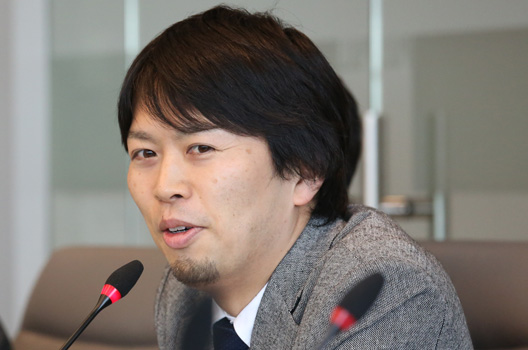
Interview with Kota Suechika of Ritsumeikan University in Kyoto, Japan
Japan can use its good relationships with various actors in the Syrian civil war to help end the conflict that this month entered its sixth year, according to Kota Suechika, a professor at the College of International Relations at Ritsumeikan University in Kyoto, Japan.
Japan’s options are limited because of its pacifist constitution. However, “Japan has got unique currency maintaining relations with various conflict actors, including state and non-state ones,” said Suechika.
Japanese Prime Minister Shinzo Abe has sought to revise the constitution following the national anger that followed the beheading of two Japanese hostages by the Islamic State of Iraq and al-Sham (ISIS) in Syria in January of 2015.
Suechika said he was surprised by Abe’s tough position following news of the murder of the hostages: Haruna Yukawa and Kenji Goto. “It did affect the Japanese anti-ISIS sentiment,” said Suechika, but, he added, “It didn’t change Japan’s Middle East policy a lot.”
Kota Suechika spoke in an interview with the New Atlanticist’s Ashish Kumar Sen on a visit to the Atlantic Council in March. Here are excerpts from our interview, which has been edited for clarity.
Q: President Obama has been criticized for his Syria policy. You believe military intervention cannot produce a lasting solution. What are your thoughts on President Obama’s approach?
Suechika: President Obama’s decision not to take military actions in Syria in September 2013, I wouldn’t say it was right or wrong, but all we know today is that a military solution is totally out of date in the context of the international effort to end the crisis.
International consensus is beginning to be formed on the point that only political solution can succeed, which was actually agreed as a first stage of the Geneva process in June 2012, which was prior to the Ghouta chemical attacks in 2013.
The idea of a political solution—peace by Syrians, peace for Syrians—was a principal part of the Geneva process but it was never implemented in a practical way by the time of the Vienna conference last November due to the severe dispute over [Syrian] President [Bashar] Assad’s fate among the actors.
We can now observe the forming of international consensus with some compromises among the actors, particularly between the United States and Russia. It is a remarkable progress toward the end of the crisis although it is step by step in nature.
Q: What role do you see for Japan in Syria?
Suechika: Due to domestic and international constraints, Japan cannot implement hard power projection over the Syria crisis. Japan can take part in only humanitarian relief missions in the neighboring countries.
Japan can exercise its unique soft power and diplomatic power to contribute to international efforts to end the war. Japan has got unique currency maintaining relations with various conflict actors, including state and non-state ones.
Q: In what ways did the beheading of two Japanese nationals, Haruna Yukawa and Kenji Goto, by ISIS shape Japan’s response to developments in Syria?
Suechika: It was a tragedy. [Japanese] Prime Minister [Shinzo] Abe expressed his deep grief on the tragedy and I was surprised that he took an unusual tough stand toward ISIS with a spirit of vengeance. It did affect the Japanese anti-ISIS sentiment. It didn’t change Japan’s Middle East policy a lot. That was because Japan does not have a wide range of policy choice, but to just continue its humanitarian assistance.
Q: You have described the Middle East as an unfinished story. In what ways is ISIS shaping that story?
Suechika: My view is that the making of the modern Middle East is an unfinished story. The Arab Spring should be seen as a part of it. What kind of state should be created in the former Ottoman territories where the political vacuum appeared after the collapse of the empire? In Syria, Lebanon, Jordan, and Iraq, and also Palestine and Israel—when these nation states came into existence we thought that it was the end of the story. But an important fact is that the Arabs did not choose these nation states on their own will. It was mainly the outcome of the power politics of the region, as well as the West. Therefore, we should not see the existing nation states, or the completion of them, as the end of the story.
This unfinished story in the Middle East was not really questioned that much until the 2011 Arab Spring because there obviously existed a framework of the nation states. Also, there was dictatorship and therefore people could not express their opinions freely. That’s why it was not really challenged or questioned until the Arab Spring.
The Arab Spring removed that cap. People started to speak their opinion freely and take actions. They started asking whether new states should be formed based on the idea of nation states, or something else, maybe an Islamic state. In that context, the so-called Islamic State appeared as a kind of alternative or a new project to create a new state in the political vacuum.
Q: What should the international community do to help the region through the Arab Spring?
Suechika: I am against any military intervention. The international community should help to make a political and social arena in Arab countries where people can express their views on what kind of state or what kind of society they wish to create.
Ashish Kumar Sen is a staff writer at the Atlantic Council.
Image: “The international community should help to make a political and social arena in Arab countries where people can express their views on what kind of state or what kind of society they wish to create,” said Kota Suechika, a professor at the College of International Relations at Ritsumeikan University in Kyoto, Japan. (imagelinkphoto.com/Dennis Kan)
